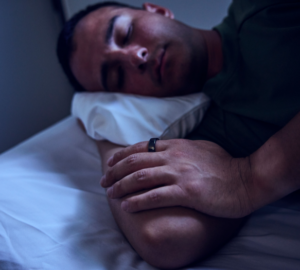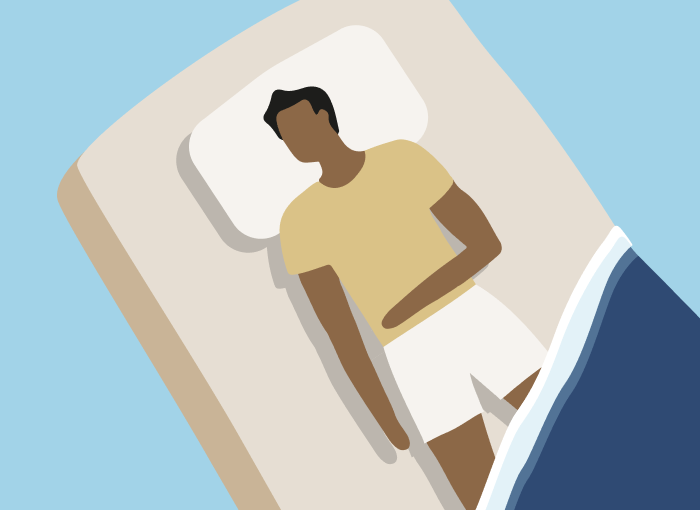Whether you’re a duvet stealer or snorer, we all sleep differently. Maybe you’re a “yearner” who sleeps on their side with outstretched arms, or a stomach sleeper in the “freefall position” with arms wrapped around your pillow.
No one sleeping position is objectively perfect across the board, which is why it’s helpful to learn about each to understand how it will impact your unique sleep quality and health. So, let’s consider the “soldier sleeping position” — a form that’s associated with less spinal pain for some. We’ll cover common misconceptions about the sleeping position, its benefits and drawbacks, and how to improve your sleep quality if you choose to catch some z’s this way.
And while the Oura Ring won’t tell you exactly how to sleep, members can use insightful data from the Oura App to test and learn how different sleeping styles influence their sleep stages and overall Sleep Score.
What Is the Soldier Sleeping Position?
The soldier sleeping position isn’t just for Frankenstein. If you’re a back sleeper who keeps your legs straight and arms at your sides, you’re a “soldier” too.
This straightforward supine position is for those who sleep flat on their back while keeping their body straight (like a soldier stands).
Here’s what it looks like:
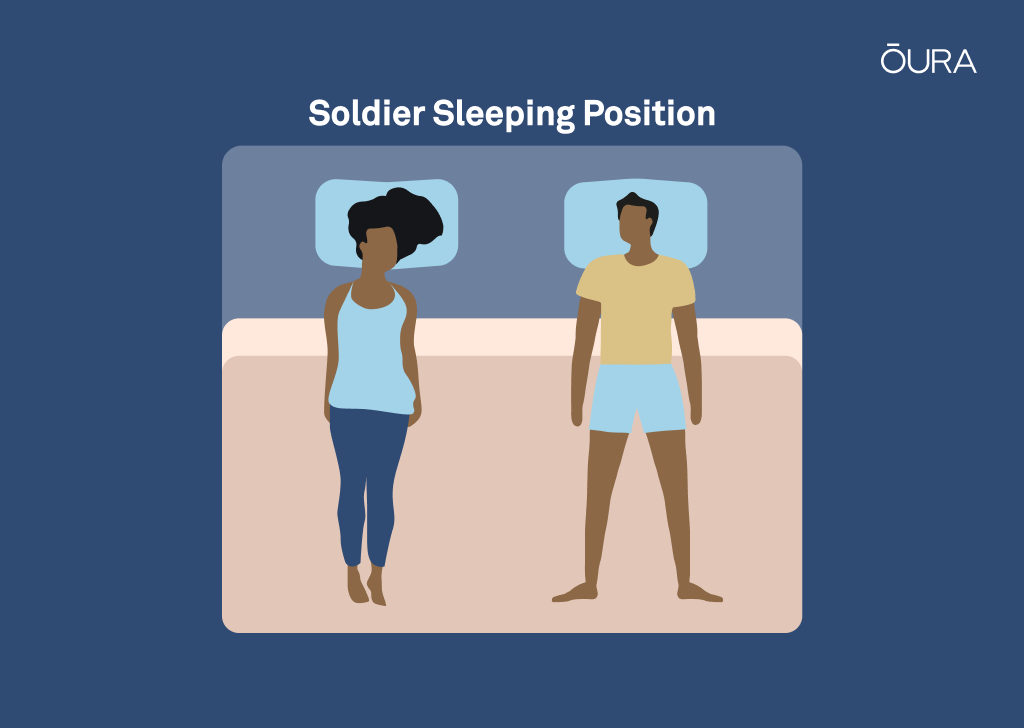
According to this UK poll, only 5% of people are soldier sleepers. However, surveys must always be taken with a pinch of salt — especially when many of us switch positions in the night without realizing.
Some common misconceptions related to the soldier sleep position are:
-
- It’s the same as the starfish position: While the two positions sound similar, starfish sleepers have their arms spread out in a star-like shape.
- It’s the best position for everyone: Different sleeping positions work for different people, depending on their body type, preferences, and medical conditions. It’s important to remember that the wrong position can make falling asleep hard or cause you to wake up feeling unrested.
- It’s the most common sleeping position: Per this study, most adults actually prefer side sleeping positions. The likelihood of this also increases with age and BMI.
- It means you’re quiet and reserved: According to a survey by Professor Chris Idzikowski, soldier sleepers “don’t like a fuss, but set themselves and others high standards.” However, the survey results should be interpreted with some caution because they may not represent the entire population.
The Effects of the Soldier Sleep Position on Sleep Quality
Like any sleep position, the “soldier” has benefits and drawbacks that affect the quality of your sleep.
Benefits of the Soldier Sleep Position
The American Academy of Pediatrics recommends babies sleep on their backs, citing it as the safest option to reduce the risk of sudden infant death syndrome (SIDS).
This may be because sleeping on their stomach or side can make it harder for infants to breathe and increase the bacterial load in their nasal passages.
For those who want to limit pillow-to-face contact, the soldier sleep position naturally prevents a few things:
- May prevent tension headaches: Just like your neck and spine, the soldier sleep position takes the pressure off your head and helps to prevent headaches rooted in the cervical spine.
- Can relieve sinus build-up: Sleeping in a neutral position with your head elevated helps to keep your airways clear. Gravity relieves congestion and prevents mucus from pooling in your nasal passages.
- May reduce breakouts and wrinkles: As your face isn’t pushed up against your pillow, you’ll reduce friction that can result in wrinkles. You’ll also avoid contact with your pillowcase, which can absorb sebum and transfer it back to your face (blocking your pores and causing breakouts).
It’s important to note, these benefits will vary from person to person. The quality of your pillow and mattress also plays a huge part, as certain types will elevate your head and neck more efficiently.
Drawbacks of the Soldier Sleep Position
If you struggle with blocked airways or back pain, here are some possible problems with the soldier sleep position:
- Increases snoring and sleep apnea: Sleeping on your back can lead to snoring if you’re prone to it. This won’t just annoy your partner, but it may also lead to problems with your carotid artery (which supplies blood to your brain, face, and neck). If you have sleep apnea or snore, you should consider becoming a side sleeper — you can sleep in the log or fetal positions, for example.
- Uncomfortable for some people: The soldier sleeping position can put stress on the lower back, neck, and shoulders (like stomach sleeping) without support.
- Bad for acid reflux and heartburn: If you sleep on your back without a supportive pillow and acid escapes from your stomach, it can flow freely into your esophagus and stay there. However, you can reduce these symptoms by elevating the head of your bed slightly.
- Can put pressure on your back: While the soldier sleeping position does help to keep your spine aligned, that doesn’t mean it maintains its natural curvature. As such, if you sleep in this position, you may be putting pressure on specific parts of your back without realizing it.
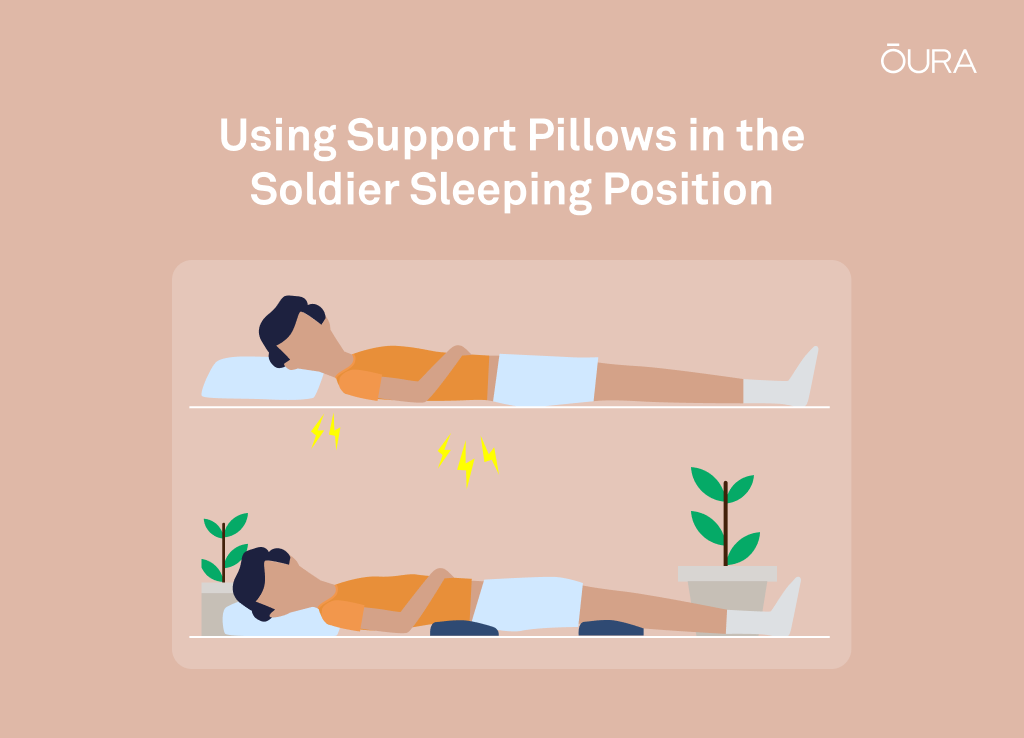
3 Tips to Improve Your Sleep in the Soldier Sleeping Position
Here are a few tips to get a good night’s sleep if you spend a lot of your time in bed in the soldier position:
1. Proper pillow placement: It’s important to use a pillow that supports your head to reduce pressure on your spine and neck pain. Back-sleeping with both hands at your sides or on your chest is widely agreed to be the best way to prevent pain. Placing a small pillow under your knees can also take pressure off your lower back and aid your spine’s natural curve
2. Sleeping on a supportive mattress: The best mattress for your unique sleep posture will vary. This could be a memory foam for some or a medium-firm mattress for others. Just remember, manufacturers use their own methods to describe firmness, so make sure to test out a mattress before buying.
RELATED: How to Choose the Best Bedding for a Better Night’s Sleep
3. Stretching before bedtime: Just 10 minutes of stretching before you sleep can help improve blood flow and relieve muscle tension. This promotes relaxation and can help you avoid discomfort in the soldier sleeping position. And while you’re at it, why not try meditation too?
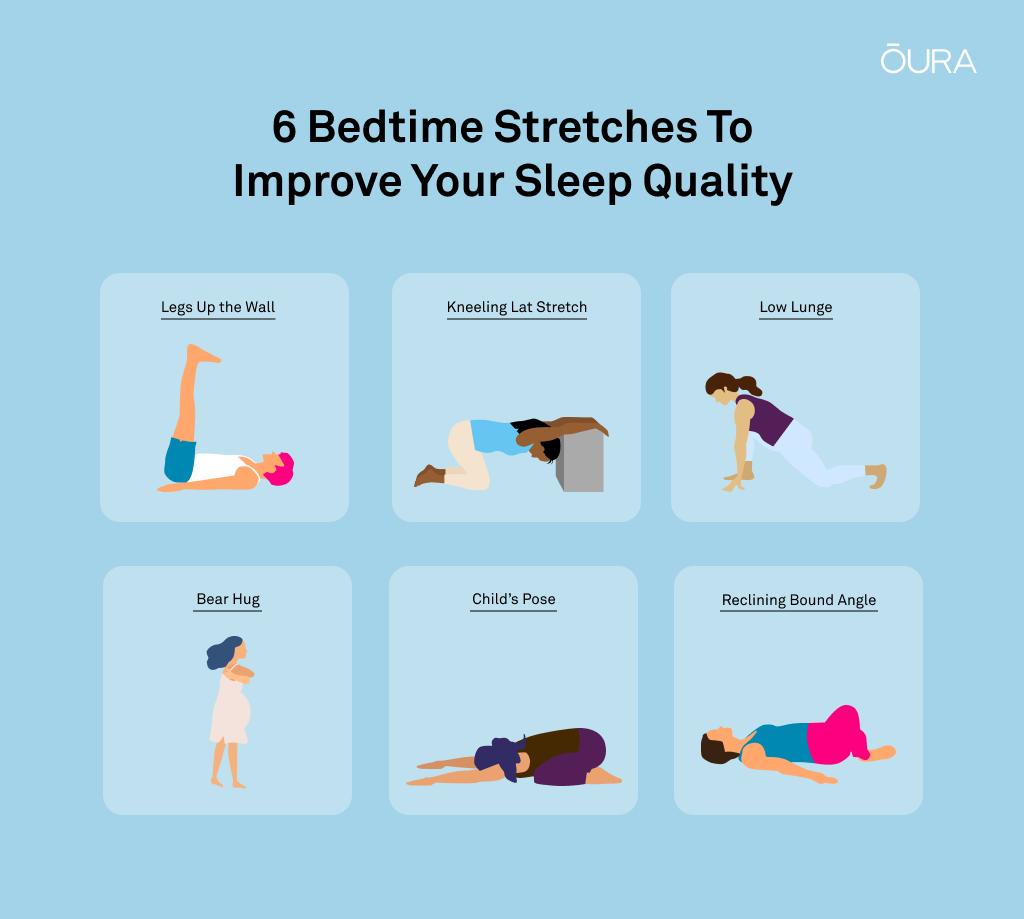
You’ll also want to keep some general tips for better sleep in mind, including:
- Turn off the blue light from your screen at least one hour before bed
- Keep a consistent sleep schedule (even on weekends)
- Choose ideal bedroom conditions based on your body temperature
- Avoid exercise or eating big meals at least three hours before bed
- Limit caffeine and alcohol intake to keep your body clock ticking regularly
READ MORE: 5 Ways to Upgrade Your Sleep Hygiene
Is the Soldier Sleeping Position Right for You?
Good posture while you sleep is just as important as standing or sitting. However, there isn’t one best or worst sleeping position for everyone.
The soldier sleeping position comes with various benefits, but it also has its disadvantages. It’s a good idea to experiment with a few positions and tactics (even your bedding) to find which works best for you.
By paying attention to your bedtime routine and how much comfort different sleep positions provide, you can make changes to your habits to achieve better sleep regularly.
Did you know you can use Oura to detect tossing and turning? Try out the Movement graph to help you see whether the soldier position is impacting the restorativeness of your sleep.



